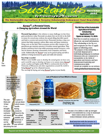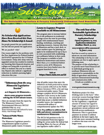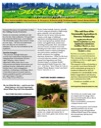Newsletters are published twice a year. They contain articles related to the mission of the Scholarship. The summer issue introduces the current year scholarship recipient. Click on an image in order to download a pdf or e-publication of that issue. You can sign up on the mailing list to receive notification of new issues as they are released. The latest issue is on top of the list.
Newsletter No. 17, June 2023 introduces this year’s scholarship recipient.
The center pages addresses water pollution problems/sources and the chemical free solutions.
References are in the newsletter itself.
Newsletter No. 14, January 2022, announces the 2022 Scholarship availability, and includes discussions about whether clean drinking water is a right or a privilege.
The center section addresses the historic drop in purity in our water, air, soil, healthy forests and precipitous drop in pollinators world wide.
This newsletter makes many references to related publications. Below are the links:
An assessment of published data
https://www.ewg.org/interactive-maps/2020-in-minnesotas-farm-country-nitrate-pollution-of-drinking-water-getting-worse/
Discussions of what and when Antropocene is
https://www.merriam-webster.com/dictionary/Anthropocene
http://www.nationalgeographic.org/encyclopedia/anthropocene/
More than 300 polluted lakes and rivers added to Minnesota's impaired waters list.
Drinking water nitrate and human health
https://www.ncbi.nlm.nih.gov/pmc/articles/PMC6068531/
Pesticides are killing the world’s soils
https://www.scientificamerican.com/article/pesticides-are-killing-the-worlds-soils/
Soil Health case studies from Sustainable Agriculture Association
https://conservancy.umn.edu/bitstream/handle/11299/216961/2020_CASE_STUDIES_web.pdf?sequence=1&isAllowed=y
Bad air quality in Minnesota
https://thescienceofair.com/bad-air-quality-in-minnesota/
Drinking water protection
https://www.health.state.mn.us/communities/environment/water/dwp.html
Karst in Minnesota (everything you should know about karst, lesson plans and videos, etc)
https://www.pca.state.mn.us/water/karst-minnesota
Nitrate in drinking water
https://www.health.state.mn.us/communities/environment/water/contaminants/nitrate.html
Source for nitrate map:
https://www.lccmr.mn.gov/projects/2019/work_plan_drafts/2019_04m.pdf
Report: Nitrate in drinking water a costly problem for small, rural cities
https://www.mprnews.org/story/2018/10/02/report-nitrate-drinking-water-costly-problem-
Water quality standards: Costs and benefits for-small-rural-cities
https://www.pca.state.mn.us/water/water-quality-standards-costs-and-benefits
Newsletter No. 15, June 2022 introduces this year’s scholarship recipient, discusses how worldwide efforts to advance agroecology is stymied by the US.
The center pages presents how the UNited Nations tries to develop pathways to sustainable agriculture and gorestry worldwide, but that the US stands in the way. The five levels of transitions towards sustainable food systems show how far we have to go.
This newsletter makes many references to related publications. Below are the links:
Transforming food systems with agroecology
Steve Gliessman
https://doi.org/10.1080/21683565.2015.1130765
The 5 Levels of Transition Towards Sustainable Food Systems Show How Far We Have to Go#14 Agroecological and other innovative approaches for sustainable agriculture and food systems that enhance food security and nutrition (2019)
All HLPE reports are available at www.fao.org/cfs/cfs-hlpe
Opposition to Sustainable Agriculture & Forestry is Powerful
https://www.resilience.org/stories/2021-08-20/qa-the-united-nations-agroecology-negotiations-and-food-systems-summit/
Worldwide Efforts to Advance Agroecology is Stymied by the US
Source: From Institute for Agriculture and Trade Policy (https://www.iatp.org article by Shiney Varghese Jul 14, 2021). Headquartered in Minneapolis, IATP’s mission “is to work locally and globally at the intersection of policy and practice to ensure fair and sustainable food, farm and trade systems.”
Newsletter No. 16, November 2022 presents legislative findings behind a strict pesticide law introduced in New Jersey and its Montgomery County.
The center pages presents how Pollution Problems are Getting worse and that the solutions are are practical, proven and profitable.
This newsletter makes many references to related publications. Below are the links:
This County Passed a Law to Protect the Health of Its Citizens From Pesticides
https://www.nj.gov/dep/newsrel/2011/11_0054.htm
https://www.panna.org
https://www.jerseyyards.org/threats-to-bays-rivers/new-jerseys-fertilizer-law/
https://www.montgomerycountymd.gov/lawns/law/allowed-pesticides.html
Fruits and Vegetables are Less Nutritious than They Used to Be
www.nationalgeographic.com/science April 29, 2022
New Research shows Soil disturbance can directly impact a key dietary factor associated with long-term human health.
Pennsylvania State University , February 7, 2022
Pesticide Use is Up in the US and All Over the World
Source: Copied from Fig 3.2 in the USEPA report: https://www.epa.gov/sites/default/files/2017-01/documents/pesticides-industry-sales-usage-2016_0.pdf
Minnesota’s Impaired Waters List Is Growing—AgainStar Tribune November 13, 2019
The above does not include what is happening to our drinking water!
Report from Minnesota Pollution Agency which can be found at www.pca.state.mn.us/sites/default/files/wq-am1-10.pdf
Soil Health Practices increased net farm income an average of $52.00 per acre for corn growers and $45.00/acre for soy bean growers as reported by the Soil Health Institute.
The report can be found at https://soilhealthinstitute.org/app/uploads/2022/01/Economics-of-Soil-Health-Minnesota-04-12-21-vFinal.pdf
‘Green’ programs encourage Minnesota farmers to fight water pollution
By Chloe Johnson (https://www.startribune.com/chloe-johnson/9346094/)
Star Tribune JULY 26, 2022
Newsletter No. 13, May/June 2021, announces the 2021 Scholarship recipient, includes an article by Jim VanDerPol, a Minnesota farmer, addressing the need to change the agricultural practices to become sustainable.
The center section addresses the significant drop in nutrition in fruits, vegetables, and grains over the last 50 years and provides information about the link between healthy soils and good nutrition.
Go to this page for references and their links
Newsletter No. 10, December 2019 focuses on water pollution in lakes, rivers, and ground water
Newsletter No. 11, May 2020 introduces the 2020 scholarship recipient and presents economic benefits of regenerative agricultural practices
Newsletter No. 12, November 2020 announces the 2021 Scholarship application program, discusses how to expand use of cover crops, and defines the concept of the beneficial Circular Economy.
Links to references can be found here.
Newsletter No. 8, December 2018 announces the schedule for the 2019 Scholarship applications and award, presents a profile of Bruce Ause—the accomplished environmental educator, presents issues and solutions about water quality, and provides update about a previous Scholarship recipient.
Newsletter No. 9 published June 2019.
Contains introduction to the 2019 Scholarship recipient and articles about the disappearing pollinators around the world.
Newsletter No. 7, June 2018 tells why no scholarships were offered this year, presents a profile of one of the major donors, and announces the dates for the 2019 Scholarship applications, in addition to other information.
Clicking on the image downloads a pdf file of the newsletter.
NEWSLETTER No 6, December 2017.
The main article addresses the need for healthy biomes in the soil, the oceans, and the gut.
The format is 8 1/2 x 17 inches.
To download a full size pdf version, NL 6 Dec-2017.pdf
If you want us to mail you a copy, just send us an e-mail: dag@dagknudsen.com
Newsletter Issue No. 5, June 2017
announces the 2017 school year scholarship recipient, provides information on soil health, and details about donating to the fund.
Here are the links to information presented in the newsletter:
1) http://scienceline.org/2011/07/lawns-vs-crops-in-the-continental-u-s/
2) Cristina Milesi (earthobservatory.nasa.gov)
3) https://en.m.wikipedia.org/wiki/Lawn
4) https://www.nrcs.usda.gov/wps/portal/nrcs/main/soils/health/
5) http://harvardmagazine.com/2011/03/when-grass-isnt-greener
6) https://permaculturenews.org/2010/06/17/the-story-of-soil/
Newsletter Issue No. 4, January 2017 announces the scholarship program for college students with an application deadline of April 15. Click the image to down load the issue.
This newsletter focuses on the plight of pollinators.
Here are additional links to information presented in the newsletter.
“The plight of the honey bee”
https://www.plants.usda.gov/pollinators/Native_Pollinators.pdf
.mda.state.mn.us/protecting/bmps/pollinators/pollinatorhero.aspx
“Saving The Soil ‘Skin,’ Thriving With No-Till”
http://www.notill.org/sites/default/files/098_rick_bieber_ctg_0814_v2.pdf
“Emerging land use practices rapidly increase soil organic matter”
http://www.nature.com/articles/ncomms7995#f1
https://www.fws.gov/pollinators/PollinatorPages/Threats.html
“How neonicotinoids can kill bees”
“To save Monrachs we need more than just milkwed”
“Firefly populations are blinking out”
“Rusty Patch Bumble Bee protected”
https://www.fws.gov/midwest/endangered/insects/rpbb/factsheetrpbb.html
Newsletter Issue No. 1, April 2016, presents the scholarship and provides overview of the problems we seek to solve. Click the image to download a copy.
Newsletter Issue No. 2, July 2016 presents the scholarship winners for 2016. Click the image to download a copy.
Newsletter Issue No. 3, October 2016, announces the Scholarship Programs for Practitioners and Students for 2017. Click the image to download a copy.
It also provides an introduction to the importance of soil health to the health of the human race.
Newsletter No. 18, November 2023.
The center pages addresses water pollution problems and proves how research shows that regenerative practices solve the environmental problems and improves farm profitability by 70%.
References are in the newsletter itself.
Newsletter No. 19, June 2024
Explains why no scholarship was issued.
The center pages addresses issues with neonicotinoids and their solutions.
References are in the newsletter itself.
Newsletter No. 20 - November 2024.
Content emphasis is on the problems with CAFO operations, AND the nutritional benefits of products from pasture raised animals.
References can be found in the newsletter itself.




















